Palliative Care: Holistic Care for End of Life Care of the Person
VerifiedAdded on 2021/04/21
|6
|1783
|31
Essay
AI Summary
This essay delves into the crucial aspects of palliative care, emphasizing a holistic approach to end-of-life care for individuals facing serious illnesses. It highlights the importance of addressing not only physical pain but also the emotional, spiritual, mental, and psychological distress experienced by patients. The essay underscores the caregiver's role in providing sensitive and compassionate care, recognizing that their primary goal is to accompany patients through their journey, ensuring a peaceful and comfortable death. It emphasizes the integration of holistic care, encompassing physical, social, psychological, and spiritual needs, and offers practical strategies such as using the patient's name, maintaining eye contact, fostering open communication, and utilizing therapeutic touch. Furthermore, the essay outlines a four-stage approach to holistic care: physical, social, psychological, and spiritual, to ease the burden on caregivers and promote patient well-being. The essay concludes by stressing the significance of a caregiver's intent to care for the whole patient and being present during the patient's final moments.
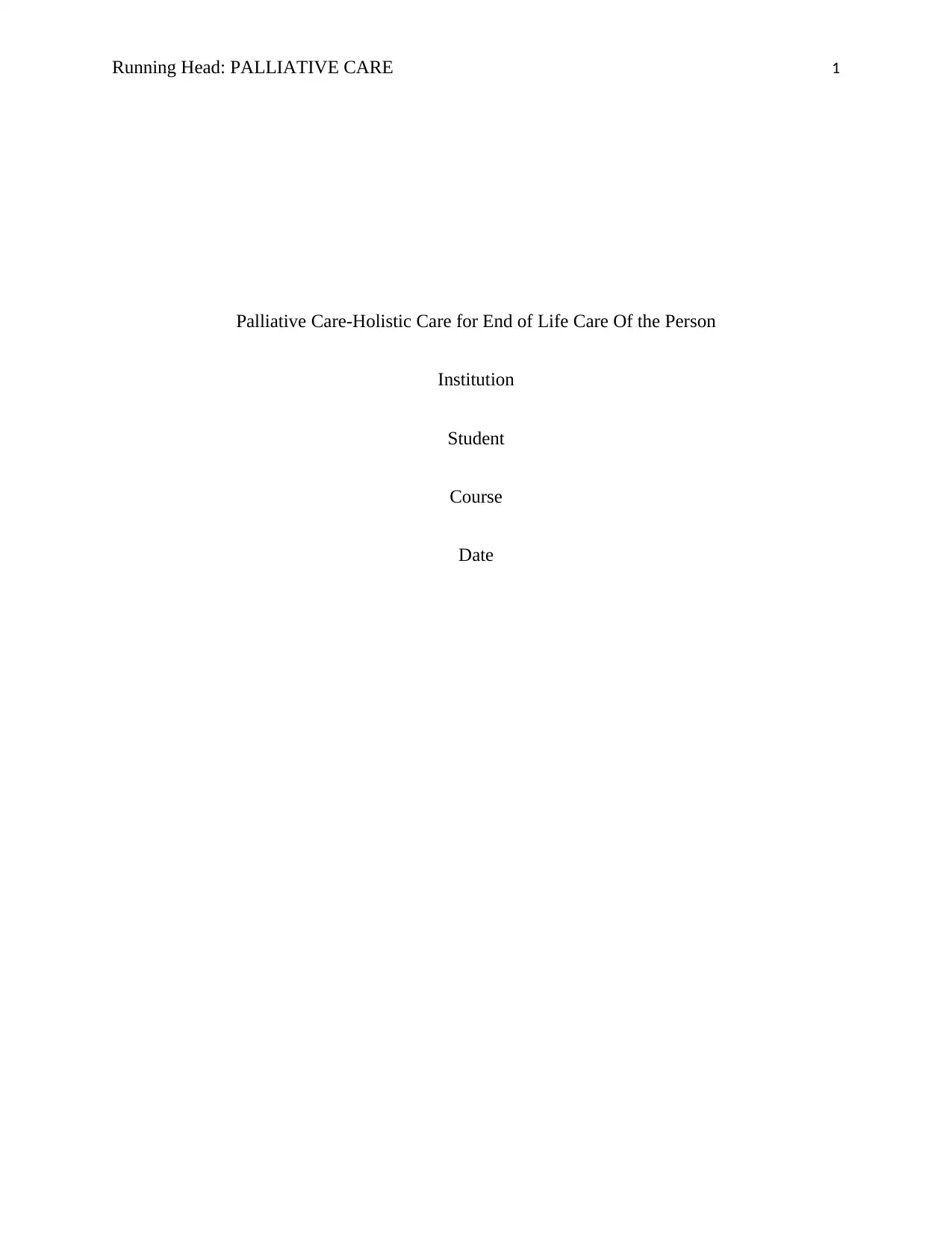
Running Head: PALLIATIVE CARE 1
Palliative Care-Holistic Care for End of Life Care Of the Person
Institution
Student
Course
Date
Palliative Care-Holistic Care for End of Life Care Of the Person
Institution
Student
Course
Date
Paraphrase This Document
Need a fresh take? Get an instant paraphrase of this document with our AI Paraphraser
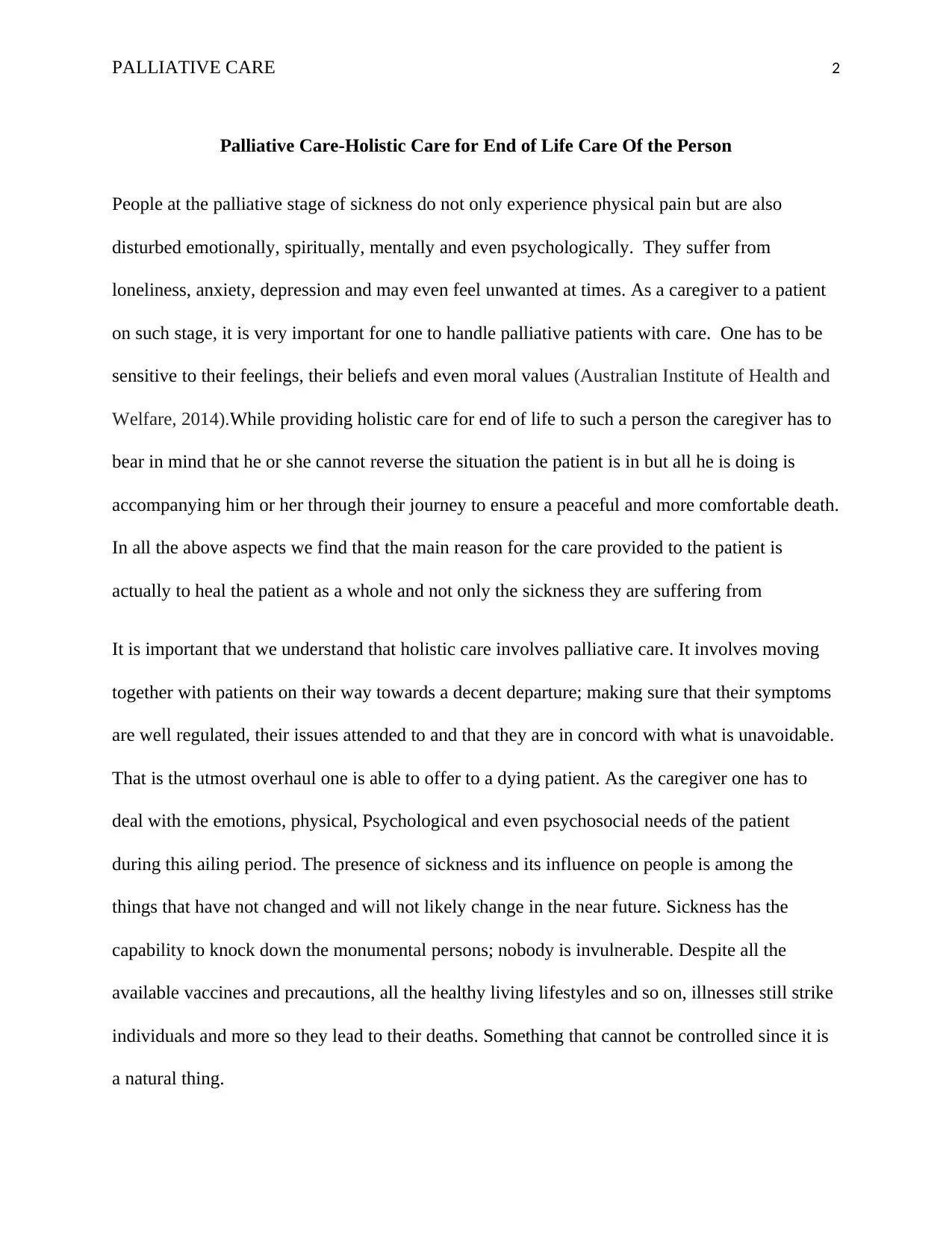
PALLIATIVE CARE 2
Palliative Care-Holistic Care for End of Life Care Of the Person
People at the palliative stage of sickness do not only experience physical pain but are also
disturbed emotionally, spiritually, mentally and even psychologically. They suffer from
loneliness, anxiety, depression and may even feel unwanted at times. As a caregiver to a patient
on such stage, it is very important for one to handle palliative patients with care. One has to be
sensitive to their feelings, their beliefs and even moral values (Australian Institute of Health and
Welfare, 2014).While providing holistic care for end of life to such a person the caregiver has to
bear in mind that he or she cannot reverse the situation the patient is in but all he is doing is
accompanying him or her through their journey to ensure a peaceful and more comfortable death.
In all the above aspects we find that the main reason for the care provided to the patient is
actually to heal the patient as a whole and not only the sickness they are suffering from
It is important that we understand that holistic care involves palliative care. It involves moving
together with patients on their way towards a decent departure; making sure that their symptoms
are well regulated, their issues attended to and that they are in concord with what is unavoidable.
That is the utmost overhaul one is able to offer to a dying patient. As the caregiver one has to
deal with the emotions, physical, Psychological and even psychosocial needs of the patient
during this ailing period. The presence of sickness and its influence on people is among the
things that have not changed and will not likely change in the near future. Sickness has the
capability to knock down the monumental persons; nobody is invulnerable. Despite all the
available vaccines and precautions, all the healthy living lifestyles and so on, illnesses still strike
individuals and more so they lead to their deaths. Something that cannot be controlled since it is
a natural thing.
Palliative Care-Holistic Care for End of Life Care Of the Person
People at the palliative stage of sickness do not only experience physical pain but are also
disturbed emotionally, spiritually, mentally and even psychologically. They suffer from
loneliness, anxiety, depression and may even feel unwanted at times. As a caregiver to a patient
on such stage, it is very important for one to handle palliative patients with care. One has to be
sensitive to their feelings, their beliefs and even moral values (Australian Institute of Health and
Welfare, 2014).While providing holistic care for end of life to such a person the caregiver has to
bear in mind that he or she cannot reverse the situation the patient is in but all he is doing is
accompanying him or her through their journey to ensure a peaceful and more comfortable death.
In all the above aspects we find that the main reason for the care provided to the patient is
actually to heal the patient as a whole and not only the sickness they are suffering from
It is important that we understand that holistic care involves palliative care. It involves moving
together with patients on their way towards a decent departure; making sure that their symptoms
are well regulated, their issues attended to and that they are in concord with what is unavoidable.
That is the utmost overhaul one is able to offer to a dying patient. As the caregiver one has to
deal with the emotions, physical, Psychological and even psychosocial needs of the patient
during this ailing period. The presence of sickness and its influence on people is among the
things that have not changed and will not likely change in the near future. Sickness has the
capability to knock down the monumental persons; nobody is invulnerable. Despite all the
available vaccines and precautions, all the healthy living lifestyles and so on, illnesses still strike
individuals and more so they lead to their deaths. Something that cannot be controlled since it is
a natural thing.
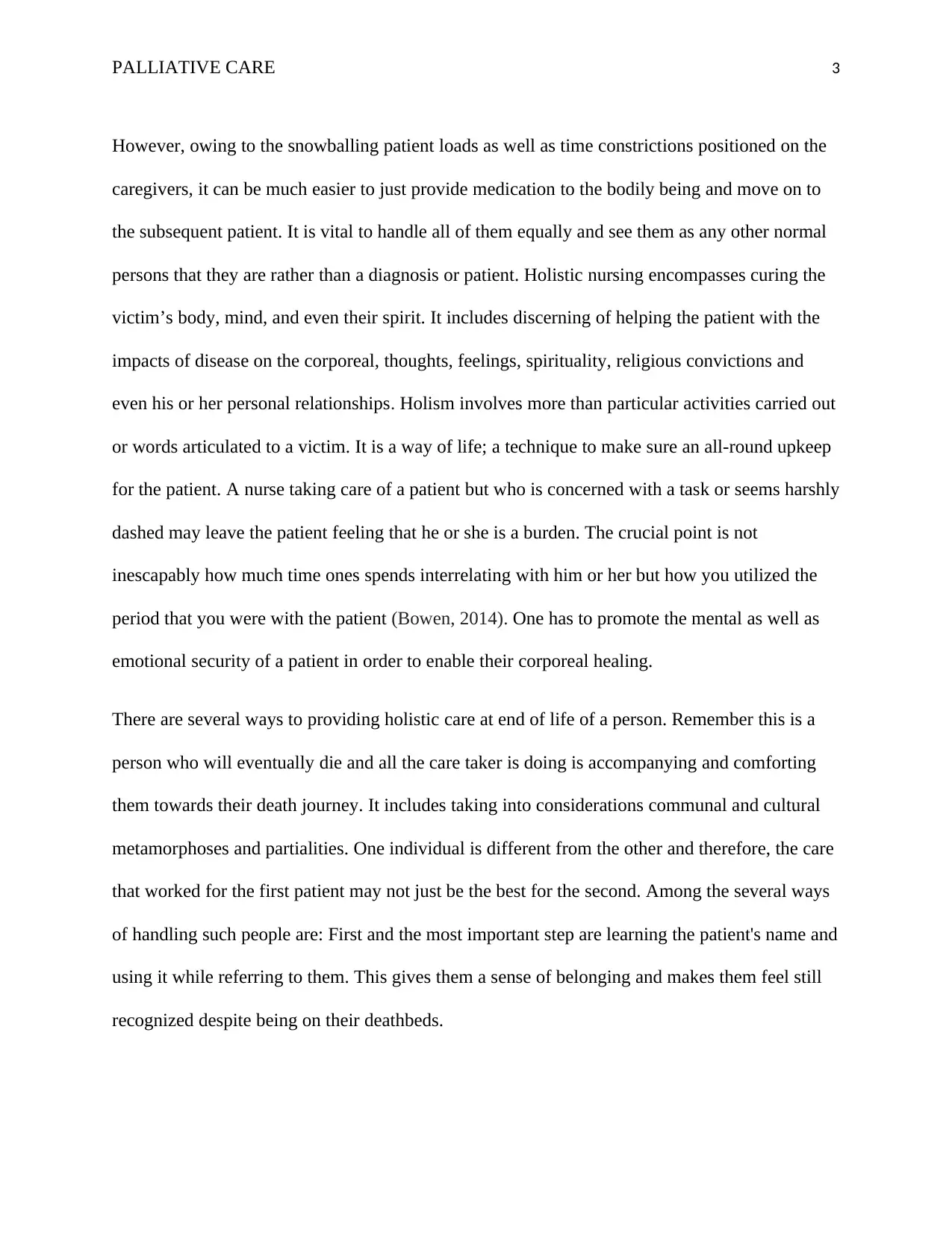
PALLIATIVE CARE 3
However, owing to the snowballing patient loads as well as time constrictions positioned on the
caregivers, it can be much easier to just provide medication to the bodily being and move on to
the subsequent patient. It is vital to handle all of them equally and see them as any other normal
persons that they are rather than a diagnosis or patient. Holistic nursing encompasses curing the
victim’s body, mind, and even their spirit. It includes discerning of helping the patient with the
impacts of disease on the corporeal, thoughts, feelings, spirituality, religious convictions and
even his or her personal relationships. Holism involves more than particular activities carried out
or words articulated to a victim. It is a way of life; a technique to make sure an all-round upkeep
for the patient. A nurse taking care of a patient but who is concerned with a task or seems harshly
dashed may leave the patient feeling that he or she is a burden. The crucial point is not
inescapably how much time ones spends interrelating with him or her but how you utilized the
period that you were with the patient (Bowen, 2014). One has to promote the mental as well as
emotional security of a patient in order to enable their corporeal healing.
There are several ways to providing holistic care at end of life of a person. Remember this is a
person who will eventually die and all the care taker is doing is accompanying and comforting
them towards their death journey. It includes taking into considerations communal and cultural
metamorphoses and partialities. One individual is different from the other and therefore, the care
that worked for the first patient may not just be the best for the second. Among the several ways
of handling such people are: First and the most important step are learning the patient's name and
using it while referring to them. This gives them a sense of belonging and makes them feel still
recognized despite being on their deathbeds.
However, owing to the snowballing patient loads as well as time constrictions positioned on the
caregivers, it can be much easier to just provide medication to the bodily being and move on to
the subsequent patient. It is vital to handle all of them equally and see them as any other normal
persons that they are rather than a diagnosis or patient. Holistic nursing encompasses curing the
victim’s body, mind, and even their spirit. It includes discerning of helping the patient with the
impacts of disease on the corporeal, thoughts, feelings, spirituality, religious convictions and
even his or her personal relationships. Holism involves more than particular activities carried out
or words articulated to a victim. It is a way of life; a technique to make sure an all-round upkeep
for the patient. A nurse taking care of a patient but who is concerned with a task or seems harshly
dashed may leave the patient feeling that he or she is a burden. The crucial point is not
inescapably how much time ones spends interrelating with him or her but how you utilized the
period that you were with the patient (Bowen, 2014). One has to promote the mental as well as
emotional security of a patient in order to enable their corporeal healing.
There are several ways to providing holistic care at end of life of a person. Remember this is a
person who will eventually die and all the care taker is doing is accompanying and comforting
them towards their death journey. It includes taking into considerations communal and cultural
metamorphoses and partialities. One individual is different from the other and therefore, the care
that worked for the first patient may not just be the best for the second. Among the several ways
of handling such people are: First and the most important step are learning the patient's name and
using it while referring to them. This gives them a sense of belonging and makes them feel still
recognized despite being on their deathbeds.
⊘ This is a preview!⊘
Do you want full access?
Subscribe today to unlock all pages.

Trusted by 1+ million students worldwide
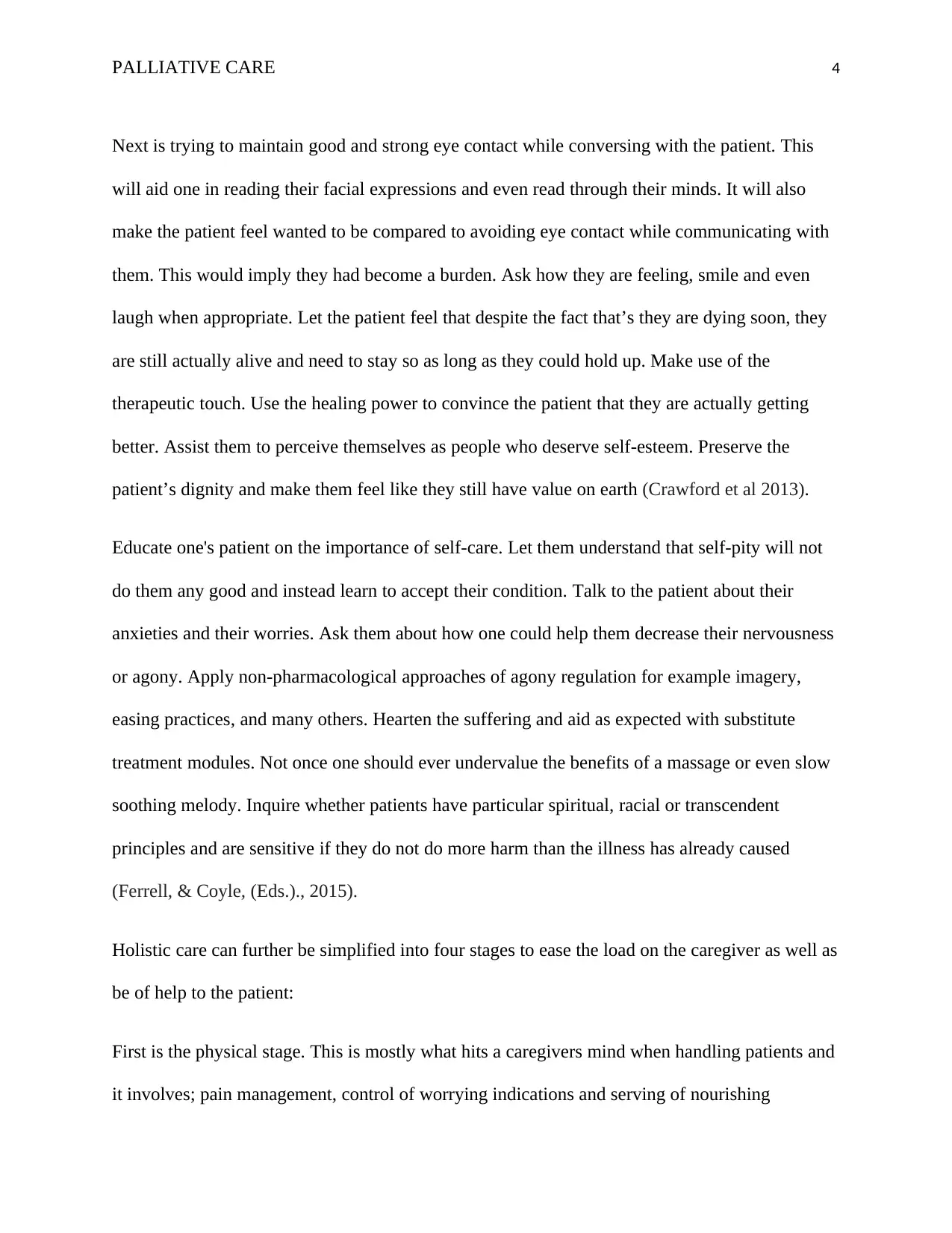
PALLIATIVE CARE 4
Next is trying to maintain good and strong eye contact while conversing with the patient. This
will aid one in reading their facial expressions and even read through their minds. It will also
make the patient feel wanted to be compared to avoiding eye contact while communicating with
them. This would imply they had become a burden. Ask how they are feeling, smile and even
laugh when appropriate. Let the patient feel that despite the fact that’s they are dying soon, they
are still actually alive and need to stay so as long as they could hold up. Make use of the
therapeutic touch. Use the healing power to convince the patient that they are actually getting
better. Assist them to perceive themselves as people who deserve self-esteem. Preserve the
patient’s dignity and make them feel like they still have value on earth (Crawford et al 2013).
Educate one's patient on the importance of self-care. Let them understand that self-pity will not
do them any good and instead learn to accept their condition. Talk to the patient about their
anxieties and their worries. Ask them about how one could help them decrease their nervousness
or agony. Apply non-pharmacological approaches of agony regulation for example imagery,
easing practices, and many others. Hearten the suffering and aid as expected with substitute
treatment modules. Not once one should ever undervalue the benefits of a massage or even slow
soothing melody. Inquire whether patients have particular spiritual, racial or transcendent
principles and are sensitive if they do not do more harm than the illness has already caused
(Ferrell, & Coyle, (Eds.)., 2015).
Holistic care can further be simplified into four stages to ease the load on the caregiver as well as
be of help to the patient:
First is the physical stage. This is mostly what hits a caregivers mind when handling patients and
it involves; pain management, control of worrying indications and serving of nourishing
Next is trying to maintain good and strong eye contact while conversing with the patient. This
will aid one in reading their facial expressions and even read through their minds. It will also
make the patient feel wanted to be compared to avoiding eye contact while communicating with
them. This would imply they had become a burden. Ask how they are feeling, smile and even
laugh when appropriate. Let the patient feel that despite the fact that’s they are dying soon, they
are still actually alive and need to stay so as long as they could hold up. Make use of the
therapeutic touch. Use the healing power to convince the patient that they are actually getting
better. Assist them to perceive themselves as people who deserve self-esteem. Preserve the
patient’s dignity and make them feel like they still have value on earth (Crawford et al 2013).
Educate one's patient on the importance of self-care. Let them understand that self-pity will not
do them any good and instead learn to accept their condition. Talk to the patient about their
anxieties and their worries. Ask them about how one could help them decrease their nervousness
or agony. Apply non-pharmacological approaches of agony regulation for example imagery,
easing practices, and many others. Hearten the suffering and aid as expected with substitute
treatment modules. Not once one should ever undervalue the benefits of a massage or even slow
soothing melody. Inquire whether patients have particular spiritual, racial or transcendent
principles and are sensitive if they do not do more harm than the illness has already caused
(Ferrell, & Coyle, (Eds.)., 2015).
Holistic care can further be simplified into four stages to ease the load on the caregiver as well as
be of help to the patient:
First is the physical stage. This is mostly what hits a caregivers mind when handling patients and
it involves; pain management, control of worrying indications and serving of nourishing
Paraphrase This Document
Need a fresh take? Get an instant paraphrase of this document with our AI Paraphraser
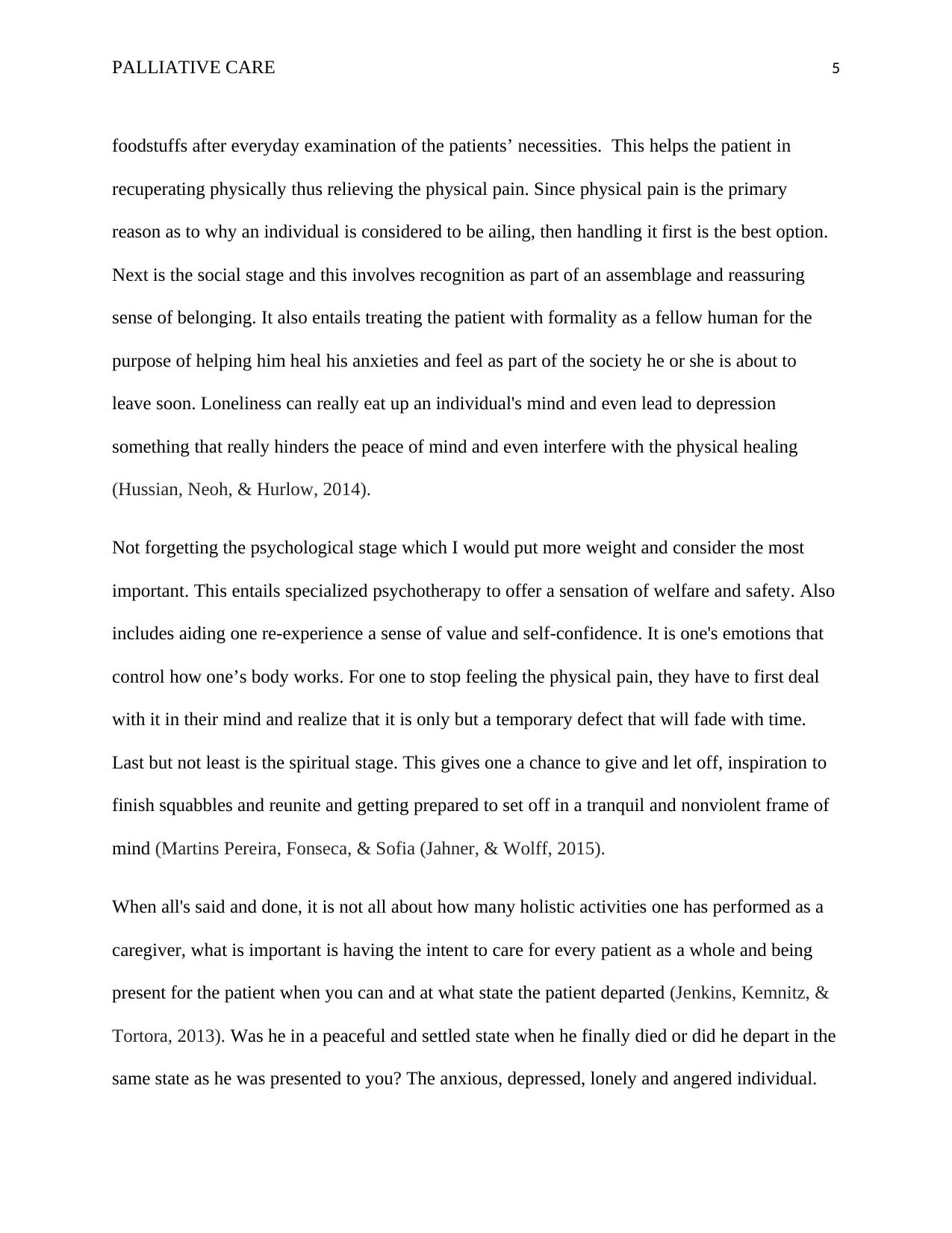
PALLIATIVE CARE 5
foodstuffs after everyday examination of the patients’ necessities. This helps the patient in
recuperating physically thus relieving the physical pain. Since physical pain is the primary
reason as to why an individual is considered to be ailing, then handling it first is the best option.
Next is the social stage and this involves recognition as part of an assemblage and reassuring
sense of belonging. It also entails treating the patient with formality as a fellow human for the
purpose of helping him heal his anxieties and feel as part of the society he or she is about to
leave soon. Loneliness can really eat up an individual's mind and even lead to depression
something that really hinders the peace of mind and even interfere with the physical healing
(Hussian, Neoh, & Hurlow, 2014).
Not forgetting the psychological stage which I would put more weight and consider the most
important. This entails specialized psychotherapy to offer a sensation of welfare and safety. Also
includes aiding one re-experience a sense of value and self-confidence. It is one's emotions that
control how one’s body works. For one to stop feeling the physical pain, they have to first deal
with it in their mind and realize that it is only but a temporary defect that will fade with time.
Last but not least is the spiritual stage. This gives one a chance to give and let off, inspiration to
finish squabbles and reunite and getting prepared to set off in a tranquil and nonviolent frame of
mind (Martins Pereira, Fonseca, & Sofia (Jahner, & Wolff, 2015).
When all's said and done, it is not all about how many holistic activities one has performed as a
caregiver, what is important is having the intent to care for every patient as a whole and being
present for the patient when you can and at what state the patient departed (Jenkins, Kemnitz, &
Tortora, 2013). Was he in a peaceful and settled state when he finally died or did he depart in the
same state as he was presented to you? The anxious, depressed, lonely and angered individual.
foodstuffs after everyday examination of the patients’ necessities. This helps the patient in
recuperating physically thus relieving the physical pain. Since physical pain is the primary
reason as to why an individual is considered to be ailing, then handling it first is the best option.
Next is the social stage and this involves recognition as part of an assemblage and reassuring
sense of belonging. It also entails treating the patient with formality as a fellow human for the
purpose of helping him heal his anxieties and feel as part of the society he or she is about to
leave soon. Loneliness can really eat up an individual's mind and even lead to depression
something that really hinders the peace of mind and even interfere with the physical healing
(Hussian, Neoh, & Hurlow, 2014).
Not forgetting the psychological stage which I would put more weight and consider the most
important. This entails specialized psychotherapy to offer a sensation of welfare and safety. Also
includes aiding one re-experience a sense of value and self-confidence. It is one's emotions that
control how one’s body works. For one to stop feeling the physical pain, they have to first deal
with it in their mind and realize that it is only but a temporary defect that will fade with time.
Last but not least is the spiritual stage. This gives one a chance to give and let off, inspiration to
finish squabbles and reunite and getting prepared to set off in a tranquil and nonviolent frame of
mind (Martins Pereira, Fonseca, & Sofia (Jahner, & Wolff, 2015).
When all's said and done, it is not all about how many holistic activities one has performed as a
caregiver, what is important is having the intent to care for every patient as a whole and being
present for the patient when you can and at what state the patient departed (Jenkins, Kemnitz, &
Tortora, 2013). Was he in a peaceful and settled state when he finally died or did he depart in the
same state as he was presented to you? The anxious, depressed, lonely and angered individual.
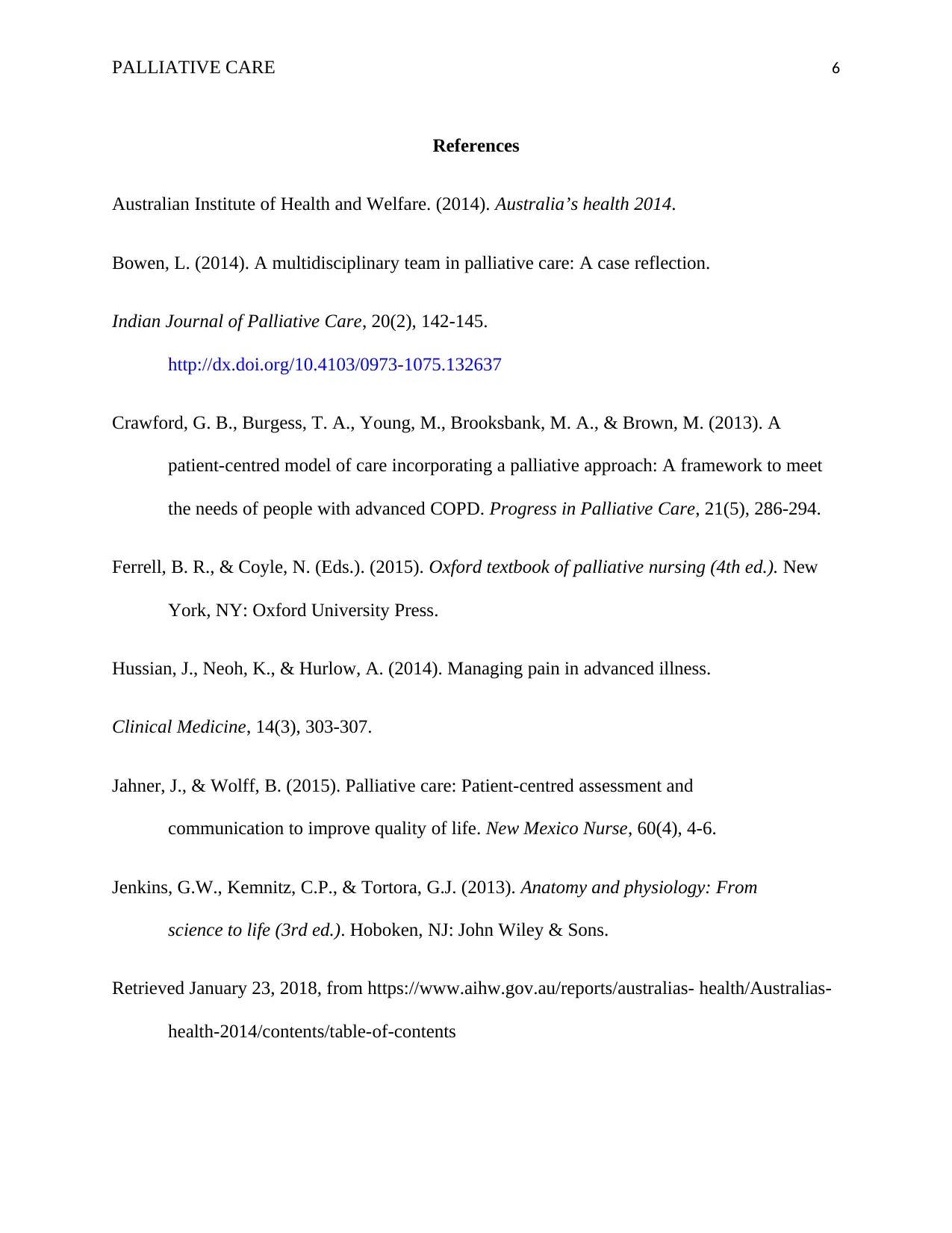
PALLIATIVE CARE 6
References
Australian Institute of Health and Welfare. (2014). Australia’s health 2014.
Bowen, L. (2014). A multidisciplinary team in palliative care: A case reflection.
Indian Journal of Palliative Care, 20(2), 142-145.
http://dx.doi.org/10.4103/0973-1075.132637
Crawford, G. B., Burgess, T. A., Young, M., Brooksbank, M. A., & Brown, M. (2013). A
patient-centred model of care incorporating a palliative approach: A framework to meet
the needs of people with advanced COPD. Progress in Palliative Care, 21(5), 286-294.
Ferrell, B. R., & Coyle, N. (Eds.). (2015). Oxford textbook of palliative nursing (4th ed.). New
York, NY: Oxford University Press.
Hussian, J., Neoh, K., & Hurlow, A. (2014). Managing pain in advanced illness.
Clinical Medicine, 14(3), 303-307.
Jahner, J., & Wolff, B. (2015). Palliative care: Patient-centred assessment and
communication to improve quality of life. New Mexico Nurse, 60(4), 4-6.
Jenkins, G.W., Kemnitz, C.P., & Tortora, G.J. (2013). Anatomy and physiology: From
science to life (3rd ed.). Hoboken, NJ: John Wiley & Sons.
Retrieved January 23, 2018, from https://www.aihw.gov.au/reports/australias- health/Australias-
health-2014/contents/table-of-contents
References
Australian Institute of Health and Welfare. (2014). Australia’s health 2014.
Bowen, L. (2014). A multidisciplinary team in palliative care: A case reflection.
Indian Journal of Palliative Care, 20(2), 142-145.
http://dx.doi.org/10.4103/0973-1075.132637
Crawford, G. B., Burgess, T. A., Young, M., Brooksbank, M. A., & Brown, M. (2013). A
patient-centred model of care incorporating a palliative approach: A framework to meet
the needs of people with advanced COPD. Progress in Palliative Care, 21(5), 286-294.
Ferrell, B. R., & Coyle, N. (Eds.). (2015). Oxford textbook of palliative nursing (4th ed.). New
York, NY: Oxford University Press.
Hussian, J., Neoh, K., & Hurlow, A. (2014). Managing pain in advanced illness.
Clinical Medicine, 14(3), 303-307.
Jahner, J., & Wolff, B. (2015). Palliative care: Patient-centred assessment and
communication to improve quality of life. New Mexico Nurse, 60(4), 4-6.
Jenkins, G.W., Kemnitz, C.P., & Tortora, G.J. (2013). Anatomy and physiology: From
science to life (3rd ed.). Hoboken, NJ: John Wiley & Sons.
Retrieved January 23, 2018, from https://www.aihw.gov.au/reports/australias- health/Australias-
health-2014/contents/table-of-contents
⊘ This is a preview!⊘
Do you want full access?
Subscribe today to unlock all pages.

Trusted by 1+ million students worldwide
1 out of 6
Related Documents
Your All-in-One AI-Powered Toolkit for Academic Success.
+13062052269
info@desklib.com
Available 24*7 on WhatsApp / Email
![[object Object]](/_next/static/media/star-bottom.7253800d.svg)
Unlock your academic potential
Copyright © 2020–2026 A2Z Services. All Rights Reserved. Developed and managed by ZUCOL.




